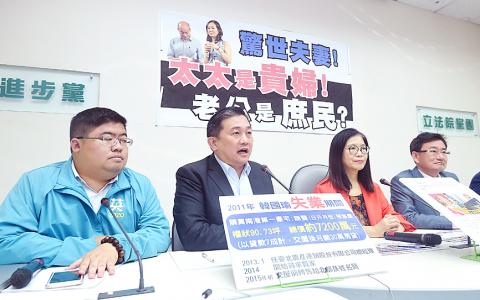Kaohsiung Mayor Han Kuo-yu (韓國瑜), the Chinese Nationalist Party’s (KMT) presidential candidate, reportedly purchased a house in Taipei’s Nangang District (南港) for more than NT$70 million (US$2.3 million at the current exchange rate) in 2011, which contradicts his campaign image as an “everyman,” the Democratic Progressive Party (DPP) caucus said yesterday.
Details of the property purchase were exposed yesterday by the Chinese-language Next Magazine.
Han on Monday uploaded to Facebook a video of himself doing laundry and on Thursday last week he used a public washroom at a Taoyuan gas station, which KMT Legislator Apollo Chen (陳學聖) said demonstrated the mayor’s “charm.”

Photo: Liao Chen-huei, Taipei Times
Han’s campaign team are attempting to portray the mayor as an everyday person, media reports have said.
Han should be more responsible in the buildup to the Jan. 11 elections and should avoid causing disruptive class conflict, DPP Legislator Kuan Bi-ling (管碧玲) said at a news conference in Taipei.
Kuan was joined by DPP legislators Wang Ting-yu (王定宇), Tsai Yi-yu (蔡易餘), Huang Kuo-shu (黃國書) and Lee Chun-yi (李俊俋).
Hon Hai Precision Industry Co (鴻海精密) founder Terry Gou (郭台銘) had also commented that the atmosphere surrounding the election was “like a class struggle” when he decided not to run as an independent presidential candidate, Kuan said, adding that Han’s attempt to portray an “everyman” image has been his strategy since he ran for mayor last year, when he ate minced pork rice and drank bottled water while meeting voters.
Wang asked how Han and his wife, Lee Chia-fen (李佳芬), were able to purchase such an expensive home in 2011 when Han was unemployed if the couple were just “everyday people.”
He asked why the couple would sell the property at a loss in 2014, when Han was head of Taipei Agricultural Products Marketing Corp (台北農產公司), and then do the same when they sold a farmhouse in Yunlin County this year for less than its market value.
The property sales were “very much contrary to common sense,” he said.
The image of the couple as “everyday people” is also contradicted by their ownership of Victoria Academy bilingual school, which has very high tuition fees, Tsai said.
Han’s campaign office spokeswoman Ho Ting-huan (何庭歡) said that Han’s and Lee’s sale of the Nangang property at a loss was due to them having underestimated the financial burden of the property.
The couple were forced to sell to recuperate their losses, she said, adding that “everyday people have the right to buy and sell property.”
Additional reporting by CNA

AIR SUPPORT: The Ministry of National Defense thanked the US for the delivery, adding that it was an indicator of the White House’s commitment to the Taiwan Relations Act Deputy Minister of National Defense Po Horng-huei (柏鴻輝) and Representative to the US Alexander Yui on Friday attended a delivery ceremony for the first of Taiwan’s long-awaited 66 F-16C/D Block 70 jets at a Lockheed Martin Corp factory in Greenville, South Carolina. “We are so proud to be the global home of the F-16 and to support Taiwan’s air defense capabilities,” US Representative William Timmons wrote on X, alongside a photograph of Taiwanese and US officials at the event. The F-16C/D Block 70 jets Taiwan ordered have the same capabilities as aircraft that had been upgraded to F-16Vs. The batch of Lockheed Martin

GRIDLOCK: The National Fire Agency’s Special Search and Rescue team is on standby to travel to the countries to help out with the rescue effort A powerful earthquake rocked Myanmar and neighboring Thailand yesterday, killing at least three people in Bangkok and burying dozens when a high-rise building under construction collapsed. Footage shared on social media from Myanmar’s second-largest city showed widespread destruction, raising fears that many were trapped under the rubble or killed. The magnitude 7.7 earthquake, with an epicenter near Mandalay in Myanmar, struck at midday and was followed by a strong magnitude 6.4 aftershock. The extent of death, injury and destruction — especially in Myanmar, which is embroiled in a civil war and where information is tightly controlled at the best of times —

China's military today said it began joint army, navy and rocket force exercises around Taiwan to "serve as a stern warning and powerful deterrent against Taiwanese independence," calling President William Lai (賴清德) a "parasite." The exercises come after Lai called Beijing a "foreign hostile force" last month. More than 10 Chinese military ships approached close to Taiwan's 24 nautical mile (44.4km) contiguous zone this morning and Taiwan sent its own warships to respond, two senior Taiwanese officials said. Taiwan has not yet detected any live fire by the Chinese military so far, one of the officials said. The drills took place after US Secretary

THUGGISH BEHAVIOR: Encouraging people to report independence supporters is another intimidation tactic that threatens cross-strait peace, the state department said China setting up an online system for reporting “Taiwanese independence” advocates is an “irresponsible and reprehensible” act, a US government spokesperson said on Friday. “China’s call for private individuals to report on alleged ‘persecution or suppression’ by supposed ‘Taiwan independence henchmen and accomplices’ is irresponsible and reprehensible,” an unnamed US Department of State spokesperson told the Central News Agency in an e-mail. The move is part of Beijing’s “intimidation campaign” against Taiwan and its supporters, and is “threatening free speech around the world, destabilizing the Indo-Pacific region, and deliberately eroding the cross-strait status quo,” the spokesperson said. The Chinese Communist Party’s “threats